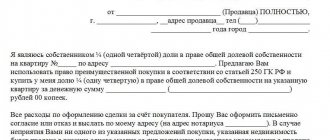The concept of private home ownership
Living in your own apartment or your own house, wanting this and striving to achieve it - all this is the norm for us, the natural order of things. Few people remember that just recently we were all just employers. And although the apartment was perceived as its own in Soviet times, in reality it was not so.
The concept of private ownership of housing returned to the lives of Russian citizens only in 1990, since the adoption of property laws in the USSR and the RSFSR. And since 1991, the share of private property in the housing stock began to grow rapidly thanks to the start of privatization. Before this, all residential property was owned by the state. The emergence of private ownership of housing required changes in legislation and the establishment of mechanisms for regulating housing relations.
Private property is one of the forms of property, meaning the absolute, legally protected right of a certain person to specific property.
Private property in housing is considered to be real estate in the housing sector, owned by citizens and legal entities. According to Russian legislation, private ownership of real estate is not limited in size, value and quantity, is ensured by the right of inviolability and is subject to mandatory registration with the Office of the Federal Registration Service.
Private property can be individual (belongs to one person) or common. Common ownership arises when two or more people take ownership of one undivided dwelling. Most of the former state and municipal housing is in common ownership of the citizens living in it; quite often apartments are inherited by several persons; Cases of joint purchase of housing are widespread.
How to find out the type of property
An extract from the Unified State Register, which is provided by Rosreestr, will help you do this. You can contact them either by appearing in person (or by visiting the MFC), or by calling, or by filling out the appropriate form on the website. Speaking of the latter: you can view general information about the property there for free, but you will have to pay a state fee for completing detailed documentation. It is the same for all regions. In 2021, a paper statement began to cost 870 rubles, and an electronic one – 350.
Documents on home ownership are required if you are going to carry out any operations with it: donate, sell, rent, etc. Therefore, do not forget about these papers and know your rights. Real estate agency "Transfer" will be happy to provide you with the necessary information!
Methods for acquiring private housing
Citizens of the Russian Federation have the right to purchase housing as private property by:
- privatization in accordance with the established procedure of occupied residential premises in houses of state and municipal housing stock;
- purchase and sale of housing, including through exchanges and auctions;
- housing construction, including construction by partnerships of individual developers;
- participation in housing and housing-construction cooperatives, condominiums;
- acquisitions by inheritance, as well as for other legal reasons.
The purchase or sale of housing must be secured by a purchase and sale agreement. Under a real estate purchase and sale agreement, the seller undertakes to transfer it into the ownership of the buyer. The form for concluding a contract for the sale of real estate is only written. The agreement is signed by the parties and is subject to state registration, from the moment of which the agreement is considered to have entered into force. The contract for the sale of real estate must stipulate the price of the object of sale.
The contract for the purchase and sale of real estate must contain data that makes it possible to definitely establish the real estate to be transferred to the buyer under the contract. In the absence of such data in the agreement, the condition on the real estate to be transferred is considered not agreed upon by the parties, and the corresponding agreement is considered not concluded.
The transfer of real estate by the seller and its acceptance by the buyer are accompanied by a document of transfer (usually a deed of transfer), which is signed by the parties. If the property, when accepted by the buyer, does not comply with the terms of the purchase and sale agreement, the seller is liable for improper performance of the agreement.
Privatization of housing
Privatization is the process of denationalization of property. Privatization of housing means the free transfer to citizens of residential premises located in the state and municipal housing stock (Section I of the Law of the Russian Federation “On Privatization...”). Each citizen has the right to acquire ownership through privatization of residential premises in the state and municipal housing stock for social use once.
An exception is made for minors who have become the owners of occupied residential premises in the manner of its privatization. This category of citizens retains the right to a one-time free privatization of residential premises in houses of the state and municipal housing stock after they reach the age of majority.
During privatization, residential premises may be transferred into the ownership of not all, but some of the persons living in it, in accordance with an agreement reached between them. Owners of a privatized residential building or apartment have the right to own, use and dispose of them at their own discretion: sell, bequeath, lease, and make other transactions that do not contradict the law.
There are 4 main forms of privatization execution:
- individual property - this form implies that the property belongs to one person. This may be when one person is registered in the apartment, or if all those living in it have renounced their rights in favor of one person.
- shared ownership - as a rule, used in the privatization of communal apartments. It is characterized by the exact size of the share of each owner. In the case of one family living, this form allows you to assign one of the rooms to each family member;
- common shared ownership - in this case, according to Art. 245 of the Civil Code of the Russian Federation, the shares of all residents who have privatized an apartment are recognized as equal (if they have not agreed on the actual division of the rooms);
- common joint property - in this case, the shares of the owners are not indicated (they are unallocated). Applies only to spouses and their minor children.
In the Russian Federation, free privatization of housing began in 1991 and will end on March 1, 2013.
Collective
Collective property has the following features:
- applies if it is owned by a team;
- team members have equal rights;
- this property has different forms when it is registered;
- individuals pool their cash savings to form a cooperative or joint-stock company;
- the previously government agency was reorganized.
Forms of collective ownership:
- cooperative;
- shareholders' property;
- property on partner ambushes.
The most important and distinguishing feature of collective property is that the property is owned by a group and the subject will not be one person, but a whole group of people or society.
Joint ownership
Joint ownership is common property without determining shares. The existence of joint ownership is explained by the presence of close personal ties between its participants. It should be noted that joint ownership of an apartment arises only in special cases (Article 244 of the Civil Code of the Russian Federation) - during privatization and when spouses purchase housing. In other cases, common property can only be shared.
In case of common joint ownership, the participants have shares, but their size in the common property is not determined and is recognized as equal. This is considered to be the housing of spouses acquired during marriage using common funds, unless there are other instructions in this regard in the marriage contract (Article 256 of the Civil Code of the Russian Federation). In case of division or inheritance of property, shares must be allocated. If one of the owners wants to sell, donate or exchange their part of the joint property, the apartment is transferred to shared ownership.
The disposal of property (and/or determination of shares) that is jointly owned is carried out by agreement of all its participants (Article 253 of the Civil Code of the Russian Federation). If the owners make an appropriate decision (or if agreement is not reached, by a court decision), shared ownership of these persons may be established on the common property.
After allocating a share, the owner has the right to dispose of his share, however, he must take into account the interests of other owners - their right to pre-emptive purchase (more on this later).
If the allocation of a share in kind from joint ownership is impossible (for example, in a one-room apartment), the allocated owner has the right to receive payment to him of the value of his share (with his consent or by a court decision) by other participants in shared ownership in the form of a sum of money or other compensation (Article 252 of the Civil Code of the Russian Federation).
Spouses' property
If a husband and wife buy or privatize housing together, it is considered common property - like everything acquired jointly during the years of marriage, with the exception of personal belongings. It doesn’t matter whether both worked or someone took care of the children and housework. In this case, the shares are not determined and are considered equal: they can be discussed and the property of each person can be specifically stated only in the marriage contract. Spouses can enter into various agreements both among themselves and with third parties. In general, property can be either shared or joint property. If housing was purchased before marriage, passed on by inheritance or as a gift, or under a marriage contract was registered in the name of one spouse, then it will not be considered community property.
After the termination of the marriage, the property rights of family members continue to apply - unless, of course, the marriage contract stipulated other conditions. Property can be divided by mutual agreement between family members: if a compromise cannot be reached, the dispute is brought to court.
Shared ownership
Shared ownership implies that each owner has a predetermined share in the ownership. According to Article 245 of the Civil Code of the Russian Federation, by agreement of all participants in shared ownership, a procedure for determining and changing shares depending on the contribution of each to the formation and increase of common property can be established.
Possession and use of residential premises in shared ownership are carried out by agreement of all co-owners. In the absence of such an agreement, they are established by the court. If the parties reach an agreement, separate use of the residential premises is possible, regardless of the size of their share in the common property.
Shares can be ideal or real. The real share corresponds to a specific object. Its allocation requires the technical ability to separate not only residential but also non-residential premises, as well as to make a separate entrance. Therefore, allocating a real share is possible in a private house, but not in an apartment in an apartment building. In practice, the share is determined in ideal terms. It is not connected to any real room or part of the apartment.
Often, it is actually impossible to isolate the shares due to the discrepancy between the real and ideal shares. In this regard, many difficulties arise - how to distribute income from such property, how to allocate shares when receiving an inheritance, etc.
In the case of donating his share to someone, its owner is not obliged to obtain the consent of other participants in shared ownership. If a share in the property is sold by one of its participants, the remaining participants in the shared ownership have the right of first refusal at the price and on the terms of its sale (except for sale at public auction). The seller of the share is obliged to inform the other participants in shared ownership in writing about the intention and conditions of the sale of his share. Cancellation of the purchase or acquisition of a share must be completed within a month. If the owner sells his share to one of the co-owners, he is not obliged to notify the others.
In the event of a violation of the pre-emptive right to purchase, any participant in shared ownership has the right to demand in court the transfer of the rights and obligations of the buyer to him within three months (Article 250 of the Civil Code of the Russian Federation). If a court is considering a dispute about invalidating a contract for the purchase and sale of residential property by one of the participants in shared ownership, the court must find out whether the right of first refusal has been respected by both the seller and the other owners of this property.
Often the violators are not the sellers of the share, but the owners of other shares in the property. They try to create various difficulties for the seller, and the sale of a share in the property becomes a problem. In order not to receive notice of the sale, other participants do not open the doors, hide, or set fire to mailboxes. In this case, you can use the help of a notary. A special situation arises if one of the owners is a child. In this case, notification is sent to his parents. Sometimes you have to obtain consent from the guardianship authorities.





